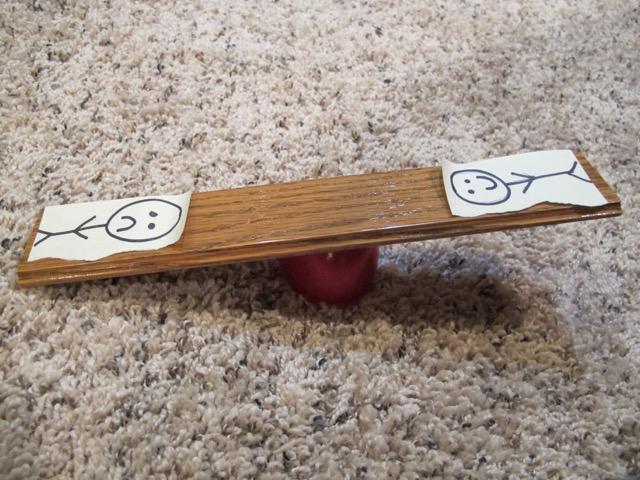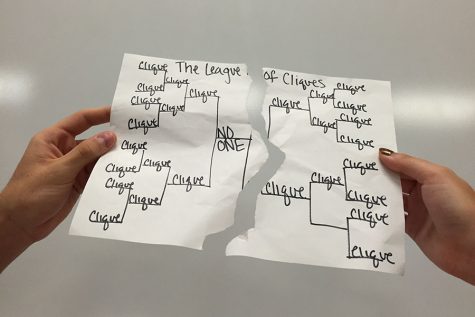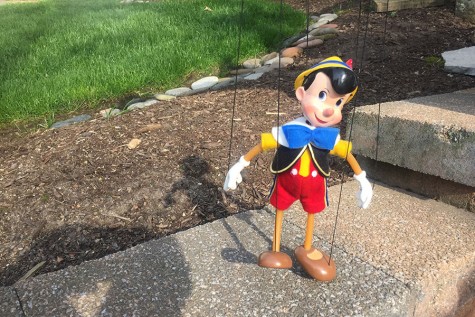Opinion: Rocca-ing the world: Ups and downs
The balance of emotions
Teeter-totter of happiness and sadness
I have been chewing on this realization: what I expect and my reality are not in sync. This contradiction results in disappointment and suffering.
I know I am not alone. Over the past week, I actually researched emotions and happiness, the thing we all unceasingly chase. And it is infinitely complicated, but I did learn a few things.
Emotions are a constant teeter-totter: up and down, up and down. We latch onto something that makes us happy, like a new car, until it becomes the new normal. And we sink back down.
This leveling out is not a bad thing, but we have been conditioned to believe that it is.
I’ll come home from school or practice totally worn out and ready to just lay in my bed. Family members will ask if something is wrong. And I wouldn’t say I’m necessarily in the best mood, but I’m not exactly unhappy either.
If we are not visibly happy, people simply assume we are somehow discontent, dissatisfied or simply not okay.
But what percentage of the day am I actually consciously happy?
There are 24 hours in the day. Let’s say I sleep eight hours. School takes up seven, so let’s say I am happy about three of those. But then I have dance team and homework for about five hours. So I am probably consciously happy about three of those.
That’s six hours a day of conscious happiness. 20 percent.
Broken down like that, it’s a wakeup call. It doesn’t seem quite right because while it’s accurate, I consider myself to be happy almost all of the time.
I have also adapted to the idea that if I’m not happy, I’m sad or frustrated or unhappy.
But there is literal scientific proof that chemically, the human brain is programmed to maintain a level of balance.
High emotions, anger, anxiety and, yes, happiness, all put our brains in a higher level of stress. So the body has to level this out in order to maintain a balance called Hedonic Adaptation.
Contentment, rather than conscious happiness, is a legitimate survival technique.
That’s why winning a game or getting a new car doesn’t constantly excite us after it happens. That would be insane.
However, the fact that five positive experiences are needed to outweigh one negative one is also insane.
The situations that happen, the opinions of others, and even the opinions of ourselves about ourselves are constantly teeter-tottering up and down, up and down.
But the highs and lows are normal. Sadness is normal.
And it is actually better to deal with sadness by talking about it or writing about it or addressing it in some way than to just push it all away as if it doesn’t exist. Because it does exist.
Talking about feelings has turned into a sort of weakness for young people.
People have started crying in front of me, usually as they are telling me something super hard or emotional for them, and they, almost every time, apologize for being too emotional. That just breaks my heart even more, though. Because at one time, I bet someone told them to “stop being a baby about it” or “stop being so dramatic.”
So we’ve learned to keep negative emotions to ourselves until we just can’t any longer, until our teeter has tottered so far down that there is nowhere to go but up.
Emotions are looked at as a vulnerability instead of a universal normalcy.
If someone cries in class, everyone freezes. But, jeez. School is hard, and people get stressed easily, so of course some people will break down in front of a class sometimes.
However when that really happens, no one knows whether to comfort the person or just let them be and act like nothing’s happening.
They are at the downswing of the teeter-totter.
The only way to get them back up is to sit on the other side with them and help them back up, not ignore them.
Acknowledgement of emotion is taking control over those emotions instead of being at their mercy.
After school, I’m always a complete stress ball with too many things on my mind. The tests I’ve taken, the tests I will take soon, the homework I have to do, dances I need to choreograph or practice, the endless tornado of high school drama, not to mention the simple things like hygiene and eating for goodness sake.
So I have all these things on my mind and BAM, a family member asks me to do a simple chore, and I freak out because I just don’t have the time! But how are they supposed to know that unless I communicate that to them
They won’t.
So me, myself, and I, the people who know me better than anyone, have to identify that I am stressed. And I’ve found that telling family members instead of just passive aggressively carrying out my chore actually helps a crazy amount.
Because we’ve all been there. Stressed, overly emotional, or just down-in-the-dumps. But no one will be able to sit with us on the other side of the teeter-totter to help us back up if we don’t ask.
I’ve found that the more I identify and talk about my emotions, the more power I will have over them. Other people can help with picking me back up, and I am the fulcrum, essential to the balance.
Your donation will support the student journalists of Eureka High School - MO. Your contribution will allow us to purchase equipment and cover our annual website hosting costs.

This is Lauren's second year on staff. You can follow her on twitter @lroccaEHS_hub. Her hobbies include Golden Line. Outside of school she is involved...























